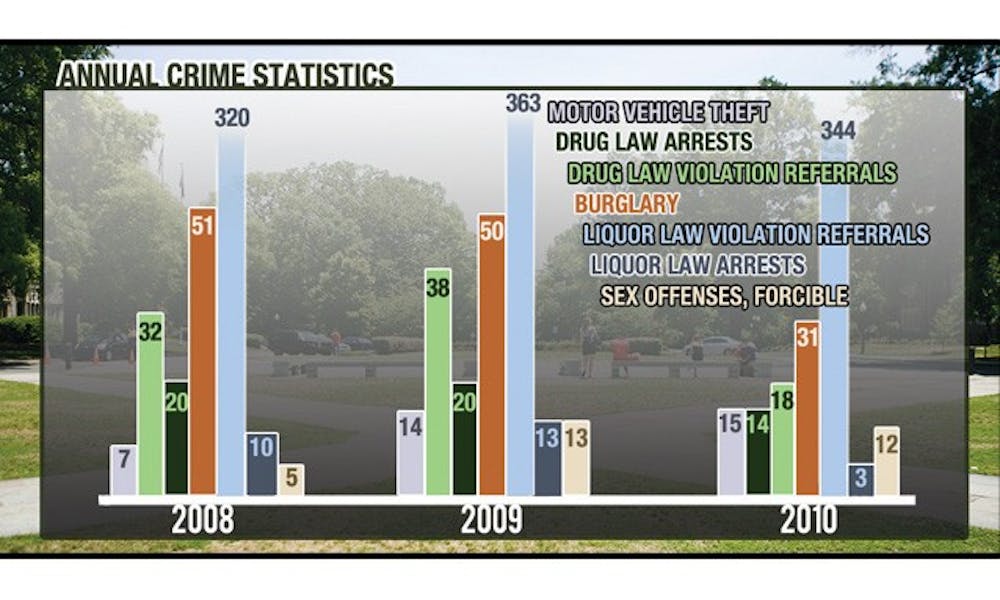University crime is on a small decline, according to a report issued by Duke University Police Department Wednesday.
According to the Clery Security Report, which is published annually per federal law, Duke’s campus and adjacent areas saw fewer reported crimes in 2010 as compared to previous years. A total of 439 crimes were reported on campus in 2010, compared to 516 in 2009 and 444 in 2008. The number of crimes reported in the last year decreased in every major category since 2009—including alcohol violations, burglaries, sexual offenses and drug violations—except for motor vehicle thefts, which increased from 14 in 2009 to 15 in 2010 on campus and in immediate vicinity.
“For the number of people we have on campus with the amount of activity and the openness, the reported crime rate indicates that Duke is a safe campus,” DUPD Chief John Dailey said, noting that the numbers fluctuate each year.
The Clery Act mandates that universities publish annual safety reports by Oct. 1, reporting crimes committed on campus and public property adjacent to it. As required by the Higher Education Opportunity Act, DUPD also released information regarding Duke’s fire safety procedures and statistics.
Referrals to the Office of Student Conduct for alcohol violations have declined to 344 in 2010 from 363 in 2009, according to the report. The number of arrests for such violations dropped from nine to two.
The report did not contain information about the number of citations for driving under the influence.
“I would think that it is all of the different prevention attempts—the conversation has not died down,” said Tom Szigethy, associate dean and director of the Duke Student Wellness Center. “The fact that the numbers are dropping is a direct reflection that the behavior is getting better.”
In general, approximately 75 percent of alcohol violations occur on East Campus, Szigethy said.
Fewer alcohol violations may have lead to fewer reports of other types of incidents, Dean of Students Sue Wasiolek said.
“We know that with many student conduct issues, alcohol is involved,” Wasiolek said. “Any indication that students are consuming alcohol more responsibly is a positive sign.”
Intoxicated students who act belligerent or physically attack others are more likely to be arrested or receive citations, Dailey said.
The number of burglaries and forcible sexual offenses in residential facilities also declined in 2010 from 2009, the report indicated.
Staff in residence halls—including resident assistants and graduate residents—have continued to work closely with DUPD on security matters, said Joe Gonzalez, associate dean for residence life. Gonzalez noted that policy regarding residential security has not changed significantly in recent years.
The number of drug arrests also declined, though most drug violations were referred to the Office of Student Conduct, according to the report.
“We see a number of students for [marijuana] use—they face a similar [disciplinary] process to alcohol violations,” Szigethy noted. “It is very rare to see other types of drugs. There’s definitely an availability component with these cases.”
Although DUPD does not directly handle investigations for crimes committed in off-campus residential areas such as the Belmont Apartments, DUPD coordinates with Duke administrators and Durham Police Department to assist students living off campus.
“We do an incredible job in the LaSalle Street and Campus Walk area—we’ve done everything from programs in the apartment complexes with property owners to coordinating with the city police,” Dailey said. “There is no obligation to do this, but we send emails to residents either from [DUPD] or through the property owners so residents can be somewhat aware of the issue.”
Effective as of last year, Clery reports are required to include information about the University’s emergency response system, said Vice President for Human Resources Kyle Cavanaugh, who also works as the emergency coordinator for the University.
The report noted the different methods the DukeALERT system uses to notify the community, including newer technology.
“These tools continue to get better, even compared to several years ago,” Cavanaugh said. “Earlier, we may have been limited to email, but now we have text messaging as an option and a more sophisticated web presence.”
Dailey believes this year’s Clery report reflects a more concerted effort from the Duke community to prevent crime on campus.
“It is really a team effort between the Duke community and police department to make sure people are not taking unnecessary risks and are also reporting suspicious activity,” he said.
Get The Chronicle straight to your inbox
Signup for our weekly newsletter. Cancel at any time.

